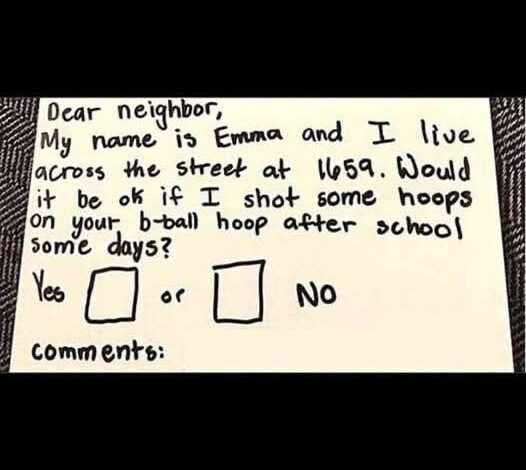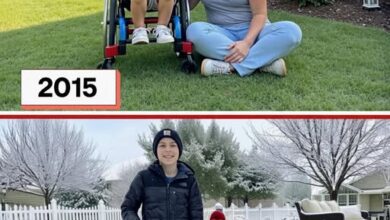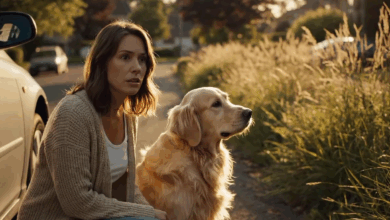
Neighbour Has Perfect Response To Little Girl!
Many people know the feeling of wanting something so badly but being unable to enjoy it — not because they don’t deserve it, but because the opportunity simply isn’t there. It’s a familiar ache, especially for children, who often live in a world full of “no,” fences, locked doors, and “maybe when you’re older.” Kids get fascinated by things just out of reach — a shiny new toy, a game they’re not allowed to play, or an activity that’s happening right in front of them but might as well be a thousand miles away. That innocent longing can be heartbreaking to watch.
This story begins with a little girl who lived in a quiet neighborhood, the kind where everyone waved from their porches and the biggest excitement was the ice cream truck crawling down the street on summer afternoons. The girl was about seven, bright-eyed and full of energy. She loved playing outdoors, hopping from one make-believe world to another without missing a beat. But the one thing she wanted more than anything was simple: to shoot hoops.
Across the street, her neighbor had a basketball hoop — a regulation one, tall and sturdy, with a clean backboard and a net that swayed perfectly with every shot. The girl watched it every single day from her driveway. She watched the neighbor’s teenage son practice layups after school. She watched groups of kids gather on weekends to play casual games, laughing loud enough for the whole street to hear. She watched adults shoot hoops in the evening just to unwind.
And she watched it all from a distance.
Her own family didn’t have a hoop. They didn’t have the space or the extra money, and even if they did, life was busy and chaotic. No one in the house played basketball anyway, so buying a hoop never made the list. But the girl fell in love with the game by watching others play it. She’d mimic the movements she saw — imaginary dribbles, pretend shots — using nothing but her hands and her imagination.
Still, she never crossed the street to ask if she could use the neighbor’s hoop. She was shy, polite to a fault, and her parents had taught her not to bother people. So every day she watched, and every day she hoped.
Eventually the neighbor, Mr. Ellis, noticed her. He’d seen her before — a quiet kid riding her scooter, drawing chalk pictures on the sidewalk. But now he saw her sitting at the edge of her driveway, legs crossed, eyes locked on the basketball hoop as though she was studying it. He wondered why she always watched but never asked to play.
One afternoon, after a long day at work, Mr. Ellis walked outside with a basketball under his arm. He spotted the girl sitting in her usual spot again, chin resting in her hands as she watched his teenage son practicing free throws.
“You like basketball?” he called out, keeping his tone gentle so he wouldn’t startle her.
She froze at first. Then she nodded, slowly. “I like watching,” she said.
“What about playing?” he asked.
She shrugged. “I never tried.”
Mr. Ellis tilted his head. “You want to?”
The girl looked around nervously, almost as if she expected someone to tell her no. “I don’t want to bother you,” she whispered.
“You’re not bothering anybody,” he said. “Come on over. The court doesn’t mind sharing.”
She hesitated, then stood, brushing the dust off her shorts. She crossed the street timidly, hands clasped in front of her like she was stepping into a sacred place. Mr. Ellis handed her the basketball. She stared at it like it was made of gold.
“It’s okay if you miss,” he said with a comforting smile. “Everybody misses at first.”
She nodded, took a deep breath, and tried to dribble. The ball bounced once, then rolled away lopsided. She scrambled after it, cheeks flushing.
“That’s how everybody starts,” he reassured her. “Try again.”
And she did. Again and again. The first ten attempts were awkward. The next ten were a little better. After twenty minutes, she was dribbling without losing the ball every time. Mr. Ellis showed her how to plant her feet, how to line up a shot, how to aim with her elbow, how to follow through.
When she finally got the ball high enough to tap the rim, her smile lit up the street.
The next day, she showed up again. But this time she didn’t wait on her driveway. She stood near the sidewalk, glancing at the hoop. Mr. Ellis waved her over before she even asked. Soon she was practicing daily — sometimes with Mr. Ellis, sometimes with his son, sometimes with neighborhood kids who invited her into their games.
Her parents hadn’t even known she was interested in basketball until they saw her coming home sweaty, red-faced, and grinning like she’d won a trophy.
Over the weeks, she improved quickly. Her dribbling tightened up, her posture straightened, and her shots became more confident. She missed far more than she made — but she didn’t care. She showed up every day anyway.
One evening, as she packed up to head home, she said shyly, “Thank you for letting me use your hoop.”
Mr. Ellis smiled. “You don’t have to thank me. You’re out here working hard. That hoop is for fun, and you deserve to have fun just as much as anyone else.”
She nodded, absorbing the words slowly in that way children do when something meaningful cuts a little deeper than expected.
A week later, Mr. Ellis installed a smaller, adjustable hoop on the side of the driveway — one that fit her height perfectly. He didn’t make a big announcement about it. He just pointed to it one afternoon and said, “This one’s yours to use whenever you want. I figured you earned it.”
The girl stood speechless for a moment, then ran to the hoop and hugged the pole.
That simple act — pure kindness, no strings attached — changed something in her. The little girl who used to watch from a distance now walked with more confidence. She played with other kids more often. She talked more. She smiled more. And she practiced like someone who finally felt she belonged on the court.
She grew stronger, quicker, more focused. Basketball became her outlet, her joy, her spark.
Years later, long after Mr. Ellis had moved away, long after the girl had grown taller than the height-adjustable hoop, she told people the truth:
Her love for basketball didn’t start with a ball or a court.
It started with a neighbor who noticed a quiet kid watching from across the street — and decided to open the door instead of leaving her on the outside.




